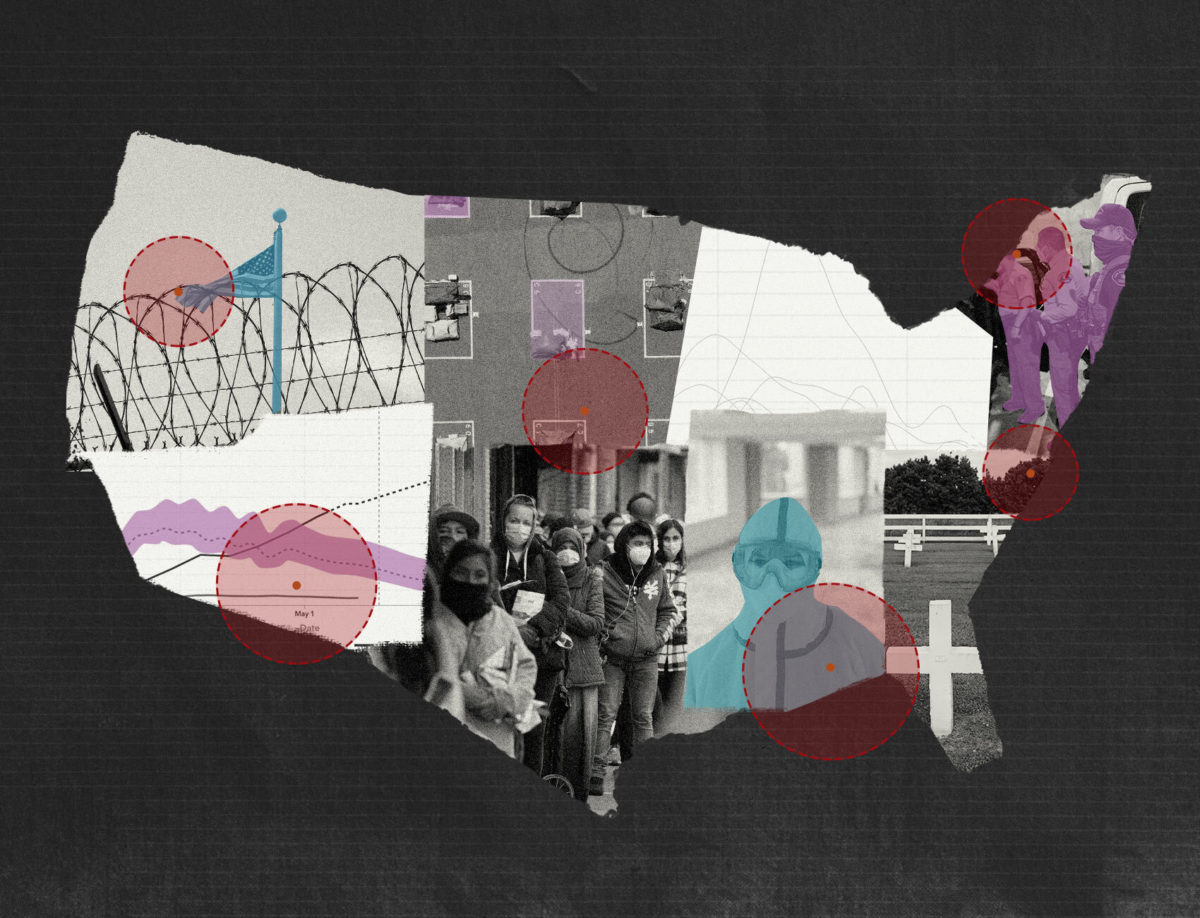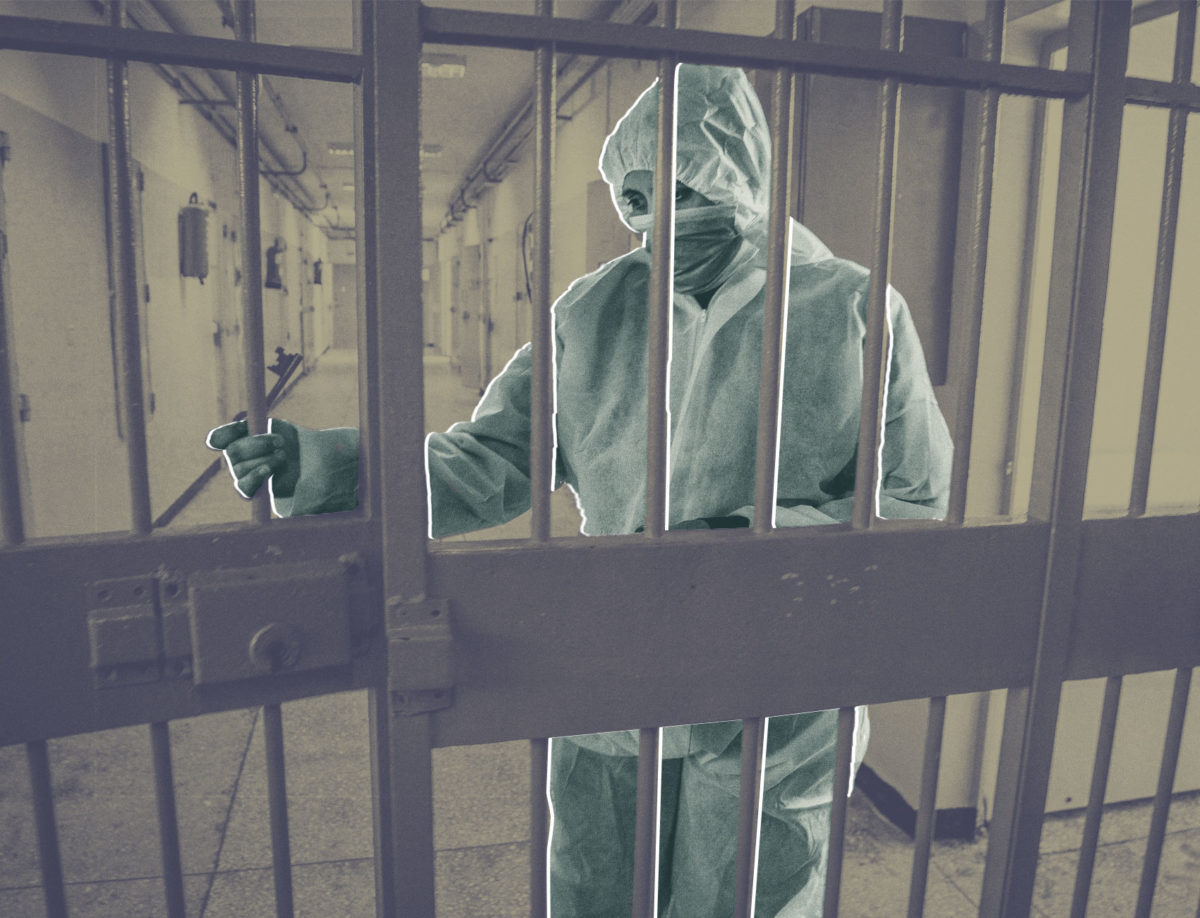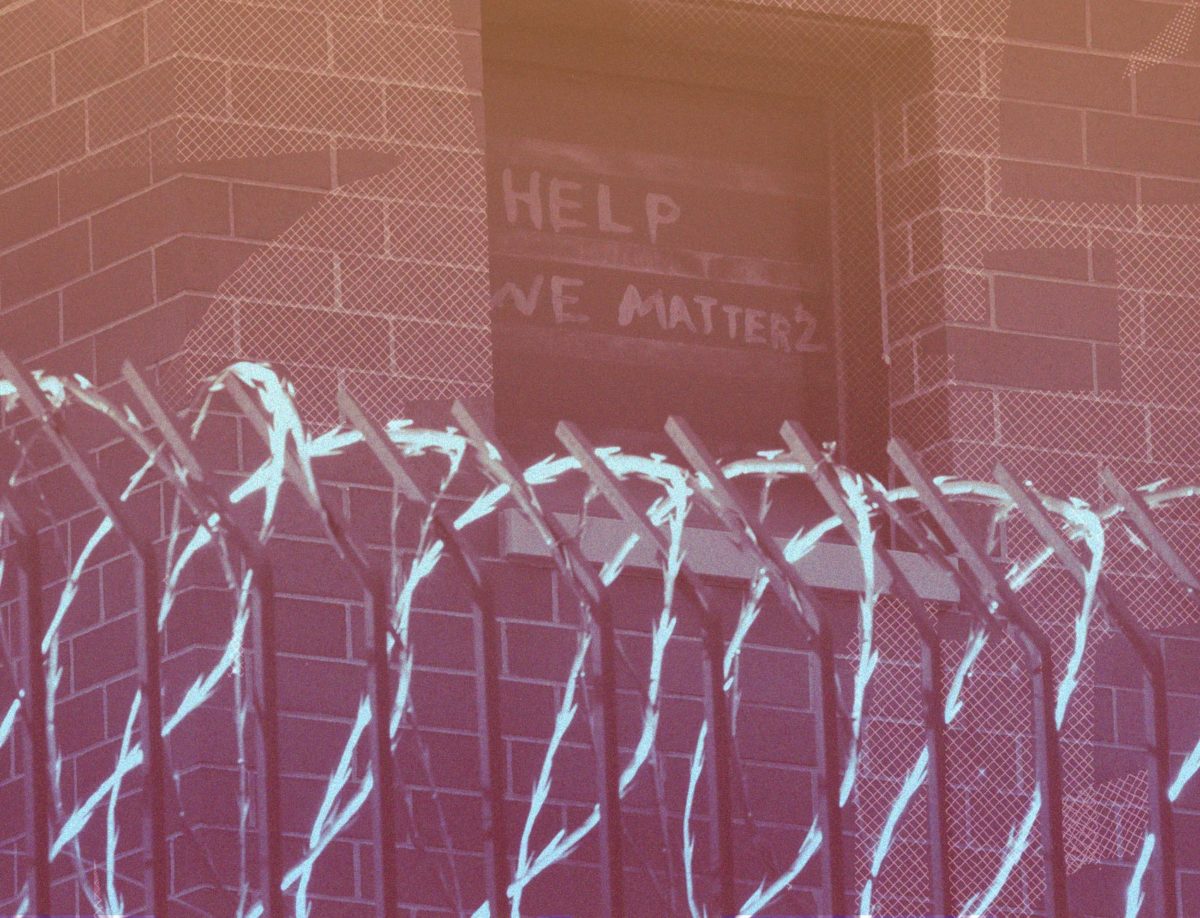
Coronavirus In Jails And Prisons
A new research project aims to better understand how COVID-19 spreads through jails, the virus continues to sweep through California’s death row, and federal prison employees are suing for hazard pay.

A new research project aims to better understand how COVID-19 spreads through jails, the virus continues to sweep through California’s death row, and federal prison employees are suing for hazard pay.

Attorneys file a class-action lawsuit over the outbreak at a California forensic psychiatric hospital, cases increase among Vermont prisoners sent to Mississippi, plus a map of new cases.

They shared their stories as part of a lawsuit seeking urgent changes to protect prisoners. One prisoner wrote that a jail officer denied his request for a mask, so he tied old underwear around his face.

Dozens of Vermont prisoners sent to an out-of-state private prison test positive for COVID-19, new study shows the prison infection rate is more than four times the general public’s, and Jay-Z’s Team Roc sues a Mississippi prison over “sub-human and deplorable” conditions.

California watchdog agency that repeatedly warned of “dire consequences” of prison overcrowding urges lawmakers to implement reforms; human rights org tweets “keep-you-up-at-night horrifying” stories from Georgia jail; and we map out four days of coronavirus outbreaks.

COVID-19 tears through a Texas prison for medically fragile women; California prisons are flattening the curve on new diagnoses, but deaths continue to climb; and the ACLU finds jails releases haven’t led to an increase in crime.

All lawmakers have a duty to use every available lever to reduce the number of people in prison, whether by compassionate release or expanded use of furloughs or some other mechanism. Taking these steps will demand immense political courage. But not doing it means consigning people—some just months away from release—to die preventable deaths.

Prisons that have lagged on releasing people have also seen significant COVID-19 outbreaks, one Indiana sheriff is spending his CARES Act money on high-tech virus prevention tools and California’s corrections chief says he’ll crack down on staff who refuse to wear masks.

There are nearly 1,000 new cases at Seagoville Federal Correctional Institution in Texas, the Cook County Jail gets praise for its COVID-19 response, and California’s jail oversight board announces plans to collect and publish county-level data.

Today’s update focuses on major outbreaks in two state prisons in tiny Buckingham County, Virginia that in June gave it one of the highest per-capita COVID-19 infection rates in the U.S.

Geriatic prison with the most deaths in Texas has a years-long history of neglect, Kentucky corrections officials won’t say how many people they’ve tested for COVID-19, and an outbreak at a remote Oregon prison grows from 20 to 120 cases in less than a week, all as Gov. Kate Brown has refused calls to decarcerate the state’s prison system.

Critics say California’s release plan is an inadequate response to the COVID-19 outbreak in the state’s prison system, 42 percent of Louisiana prisoners tested for COVID-19 are positive, and conditions at Texas and Indiana prisons get the attention of lawmakers.

A new report finds that too many kids, particularly Black youth, continue to be held in dangerous juvenile detention facilities; California prison officials refused offers of free testing before and during San Quentin outbreak; and Gov. Gavin Newsom announces plans to release 8,000 incarcerated people.

New data obtained through a Freedom of Information Law request paint a dire picture of New York City COVID-19 testing in its jails.

A new multimedia campaign seeks to amplify voices of people incarcerated in Maryland’s Prince George’s County Jail, a GEO Group stockholder sues the for-profit prison company over its ’woefully ineffective’ COVID-19 response, and widespread testing is turning up thousands of new infections.

Pressure mounts on California’s governor to release people from prison; people with months, even days, left on their sentence are dying in Texas prisons; and a new report finds higher rates of COVID-19 in prison than in the U.S. population.

Florida media outlets had to sue to obtain information on COVID prison deaths; after preventable outbreaks, California replaces its prison medical director; and the Texas prison where Andrea Circle Bear died grapples with a new outbreak.

Advocates sue to get people out of ’deplorable’ Detroit jail, Oregon prisons see more COVID cases while governor stalls on commutations, and botched transfer depletes California’s prison fire camps.

San Quentin prisoners launch a hunger strike to protest inhumane conditions; amid an outbreak, a for-profit healthcare provider refuses to test everyone in an Ohio jail; and cases are spiking at Washington state’s Coyote Ridge Corrections Center.

A California lawmaker describes the California Department of Corrections and Rehabilitation’s handling of San Quentin outbreak as “abhorrent,” private prison giant CoreCivic turns a profit amid a pandemic and an inspection of a Tennessee jail turns up “inadequate and harmful” conditions.

COVID continues to tear through San Quentin and another botched CDCR transfer results in an outbreak; cases continue to climb in jails and a prisoner at Sing Sing describes prison life amid a pandemic.

A new report gives all 50 states failing grades on how they’ve handled COVID-19 in correctional facilities, infections continue to creep into jails and the Palm Beach post takes Florida Gov. Ron DeSantis to task for his coronavirus failures.

Sacramento jail deputies agree to start wearing masks, the state agency that oversees California jails won’t collect COVID-19 data, a lockdown failed to stop infections in a women’s jail, and cases continue to increase at San Quentin.

Despite early warnings, jails and prisons have seen a rapid spread of the virus—a humanitarian disaster that puts all of our communities, and lives, at risk. Every day, The Appeal examines the scale of the crisis, numbers of infected and dead, around the nation.

Despite early warnings, jails and prisons have seen a rapid spread of the virus—a humanitarian disaster that puts all of our communities, and lives, at risk. Every day, The Appeal examines the scale of the crisis, numbers of infected and dead, around the nation.

Despite early warnings, jails and prisons have seen a rapid spread of the virus—a humanitarian disaster that puts all of our communities, and lives, at risk. Every day, The Appeal examines the scale of the crisis, numbers of infected and dead, around the nation.

Despite early warnings, jails and prisons have seen a rapid spread of the virus—a humanitarian disaster that puts all of our communities, and lives, at risk. Every day, The Appeal examines the scale of the crisis, numbers of infected and dead, around the nation.

Despite early warnings, jails and prisons have seen a rapid spread of the virus—a humanitarian disaster that puts all of our communities, and lives, at risk. Every day, The Appeal examines the scale of the crisis, numbers of infected and dead, around the nation.

Despite early warnings, jails and prisons have seen a rapid spread of the virus—a humanitarian disaster that puts all of our communities, and lives, at risk. Every day, The Appeal examines the scale of the crisis, numbers of infected and dead, around the nation.

Despite early warnings, jails and prisons have seen a rapid spread of the virus—a humanitarian disaster that puts all of our communities, and lives, at risk. Every day, The Appeal examines the scale of the crisis, numbers of infected and dead, around the nation.

Despite early warnings, jails and prisons have seen a rapid spread of the virus—a humanitarian disaster that puts all of our communities, and lives, at risk. Every day, The Appeal examines the scale of the crisis, numbers of infected and dead, around the nation.

Despite early warnings, jails and prisons have seen a rapid spread of the virus—a humanitarian disaster that puts all of our communities, and lives, at risk. Every day, The Appeal examines the scale of the crisis, numbers of infected and dead, around the nation.

Despite early warnings, jails and prisons have seen a rapid spread of the virus—a humanitarian disaster that puts all of our communities, and lives, at risk. Every day, The Appeal examines the scale of the crisis, numbers of infected and dead, around the nation.

Despite early warnings, jails and prisons have seen a rapid spread of the virus—a humanitarian disaster that puts all of our communities, and lives, at risk. Every day, The Appeal examines the scale of the crisis, numbers of infected and dead, around the nation.

Despite early warnings, jails and prisons have seen a rapid spread of the virus—a humanitarian disaster that puts all of our communities, and lives, at risk. Every day, The Appeal examines the scale of the crisis, numbers of infected and dead, around the nation.

Despite early warnings, jails and prisons have seen a rapid spread of the virus—a humanitarian disaster that puts all of our communities, and lives, at risk. Every day, The Appeal examines the scale of the crisis, numbers of infected and dead, around the nation.

Despite early warnings, jails and prisons have seen a rapid spread of the virus—a humanitarian disaster that puts all of our communities, and lives, at risk. Every day, The Appeal examines the scale of the crisis, numbers of infected and dead, around the nation.

Despite early warnings, jails and prisons have seen a rapid spread of the virus—a humanitarian disaster that puts all of our communities, and lives, at risk. Every day, The Appeal examines the scale of the crisis, numbers of infected and dead, around the nation.

Despite early warnings, jails and prisons have seen a rapid spread of the virus—a humanitarian disaster that puts all of our communities, and lives, at risk. Every day, The Appeal examines the scale of the crisis, numbers of infected and dead, around the nation.

Despite early warnings, jails and prisons have seen a rapid spread of the virus—a humanitarian disaster that puts all of our communities, and lives, at risk. Every day, The Appeal examines the scale of the crisis, numbers of infected and dead, around the nation.